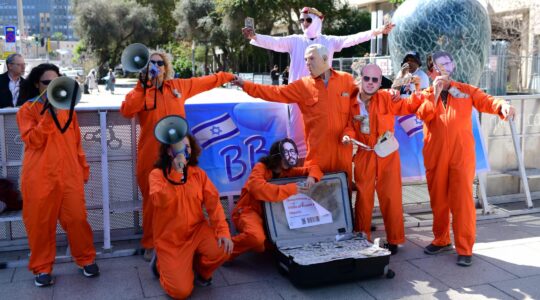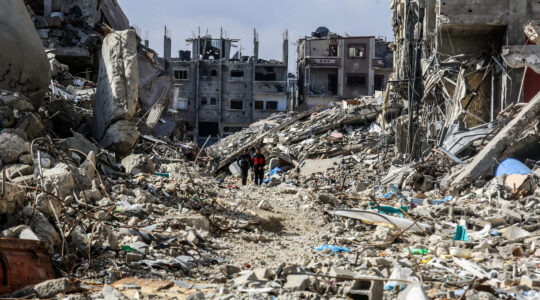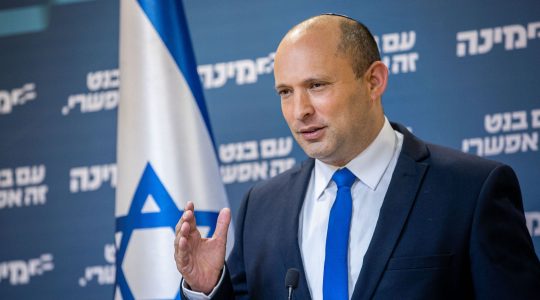JERUSALEM (JTA) – Last week, Muslim and Jewish soldiers gathered after a day’s training to eat a communal iftar, the traditional break-the-fast meal eaten after sunset during the month-long observance of the Islamic holiday of Ramadan.
“Ramadan isn’t just one day like the 17th of Tammuz or Tisha B’Av,” said Col. Ahmed Ramiz, head of the minority population directorate in the Human Resources branch of the Israel Defense Forces. “It affects an organization like ours to have so many people fasting for 30 days, because we’re the army. We don’t stop for 30 days, or even one day. But during times like these, we try to keep their needs in mind, and help out where we can.”
Ramadan — a month-long ritual during which Muslims are enjoined not to eat, drink, smoke or engage in sex during daylight hours — is formally recognized in Israeli workplaces as a religious holiday. Yet, like other Muslim holidays, it still isn’t part of the cultural map of a Jewish state more focused on Rosh Hashanah, Passover and Yom Ha’atzmaut, or Israel Independence Day.
“Sure, you get your days off and your short days during Ramadan. But there’s an issue of legitimization; Arab language and holidays and culture are marginalized,” said Amnon Be’eri-Sulitzeanu, co-executive director of the Abraham Fund Initiatives, which promotes equality and coexistence in Israel. “We have to legitimize Arab culture so that Arab citizens feel legitimized, so that they feel that Israel is their state, and that the Jewish citizens recognize their culture, heritage and tradition.”
In the Israel Civil Service, Ramadan is an accepted part of the annual calendar, figured into a combination of vacation and personal days like any other religious holiday, whether Jewish, Christian, Druze, Armenian or Greek Orthodox. Just as certain significant Jewish days – such as the summertime fast of Tisha B’Av, or the week of Chanukah, when kids are off from school — can be taken as personal days, so, too, with Ramadan. Because Islam, unlike Judaism, doesn’t have a leap month, Ramadan’s timing with the secular calendar varies from year to year and can fall in any season.
Muslims observing Ramadan generally require certain accommodations at the workplace. Some ask if they can come in late to eat sahar, the pre-dawn breakfast, or leave early to prepare for iftar, the after-sunset dinner. Representatives from Jerusalem’s municipal water company, Bank Hapoalim, and Hadassah Medical Center all shared with JTA details about the special accommodations they offer for observers of Ramadan.
In Jerusalem, the municipality announced the official start of the month with cannon shots fired from an eastern Jerusalem armory, and continued with shots fired off each day at sunrise and sunset to mark the beginning and end of the daily fast.
The municipality also sponsors an annual online Ramadan quiz that this year drew 800 participants from across Israel. Jerusalem also marks Ramadan by stringing festive lights along the Old City gates and supplying special Ramadan food to needy Arab and Christian families. In addition, various nonprofit organizations host a series of interfaith dialogues and iftar meals throughout the country.
At the President’s Residence in Jerusalem, President Shimon Peres has hosted iftar meals. On Sunday, he hosted Egypt’s deputy ambassador to Israel, Mustafa Al-Khani, and Jordanian ambassador to Israel Difla Ali al Faiz for the meal. Even Israel’s ambassador in Washington, Michael Oren, was scheduled to hold an iftar meal this week.
The IDF, which has hundreds of Muslim soldiers, primarily Bedouins, observing Ramadan, makes accommodations for them to pray and eat at the designated times, according to Ramiz.
“The army’s H.R. department handles the accommodations, and we also ease their physical training if necessary,” Ramiz said. “If you’re a combat soldier and you run 12 kilometers, you lose a lot of water, so we try to cut down on certain kinds of training, spending more time in classes during the month of Ramadan. Those working desk jobs can go home early for iftar.”
But the Abraham Fund Initiatives’ Be’eri-Sulitzeanu says Israel needs more nationwide celebration of a tradition observed in some way by one-fifth of its citizens. His organization works with one Jewish-Arab city or region each year, organizing a community iftar meal with local Jewish and Arab leaders. This year, the hosts were the Arab mayor of Rahat, a Bedouin town in the Negev, and local Jewish regional leaders.
“We’re not a production company,” Be’eri-Sulitzeanu said. “What we’re trying to do is raise awareness of and attentiveness to these cultural Arab events.”
Khaled Diab, an Egyptian-Belgian journalist currently living in Jerusalem, recently wrote a column in the Jerusalem Post in which he said that Jews and Muslims can find much in common in the fasts that are common to the three Abrahamic faiths. Diab noted that the words for fasting, tzom in Hebrew and saum in Arabic, are similar, as is the holiday etiquette, with non-observant individuals refraining from eating in public.
For Hassan Saym, a former Jordanian who employs about 10 young Arab men at his car wash on Bethlehem Road in the tony Jewish neighborhood of Baka, Ramadan can be a tough time to clean cars. He finds that his employees often have a hard time sustaining the physical labor during Ramadan. Those who are not as strictly observant as their families might think don’t want to bring food from home because they’re expected to fast, and they can’t buy food locally because of the price.
“Some just drink Coke and eat cookies while they’re here, because they can’t afford to buy the local food,” Saym said.
But his Jewish clients get it, Saym added.
“They always ask if we’re working when it’s Ramadan, and will often make do with just an outside cleaning,” he said. “I’m just thankful that Ramadan isn’t during Pesach, when everyone needs their car cleaned.”
JTA has documented Jewish history in real-time for over a century. Keep our journalism strong by joining us in supporting independent, award-winning reporting.





